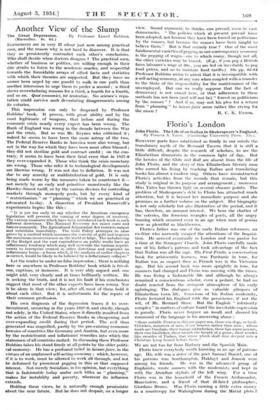Florio's London John Florio. The Life of an Italian in
Shakespeare's England. By Frances A. Yates. (Cambridge University Press. 15s.).
RomANTic poets have established so firmly in our minds the translunary myth of the Mermaid Tavern that it is still a little difficult, despite the research of scholars, to see the Elizabethan dramatists in the common light of day. But the heroics of the Globe and Bull are absent from the life of John Florio, and the story of this Elizabethan literary man who earned his living by teaching Italian and translating books has almost a modern ring. Others have reconstructed Florio's activities from the records that remain, but this study is original in its purpose and arrangement ; moreover Miss Yates has thrown light on several obscure points. The problem of Shakespeare's debt to Florio has attracted much attention, but it is beyond her immediate purpose and she promises us a further volume on the subject. Her biography is not only scholarly but also illustrative of the period, and it has, therefore, an unusual interest. We hear the chatter of the coteries, the ferocious wrangles of poets, all the angry buzzing which occurred even in an age when men of genius were as plentiful as blackberries.
Florio's father was one of the early Italian reformers, an ex-friar who narrowly escaped the attentions of the Inquisi- tion. He arrived eventually in London and was pastor for a time at the Strangers' Church. John Florio carefully made use of his father's patrons and took advantage of the fact that Italian was all the rage. His First Fruits, a conversation book for aristocratic learners, was Puritanic in tone, for Italian was as suspect then as French was in the Victorian age. But his second book was more sprightly in tone, for manners had changed and Florio was moving with the times. He was living a fashionable life and although he always remained a conscientious scholar, even a pedant, he had no doubt reacted from the stringent atmosphere of his early upbringing. The dialogues give us valuable glimpses of Elizabethan town life. Conscious of his Italian modernity, Florio lectured his England with the persistence, if not the wit, of Mr. Bernard Shaw. But the English "inferiority complex" in matters of culture found the inevitable expression in parody. Florio never forgave an insult and showed his Command Of the language in his answering abuse : "those notable Pirates in this our paper-sea, those sea-dogs, or land- Critickes, monsters of men, if not beastes rather than men ; whose teeth are Canibals, their wimp; adderforkes, their lips aspes-poyson, their eies basiliskes, their breath the breath of a grime, their wordes like swordes of Turkes, that striae which shall diuo deepest into a Christian lying bound before them."
We are not too far from Barbary and the Spanish Main.
Florio knew everybody worth knowing in an age of patron. age. His wife was a sister of the poet Samuel Daniel, one of his patrons was Southampton, Hakluyt and Jonson were among his friends. He was in the advanced group of Euphuists, wrote sonnets with the modernists and kept in with the Arcadian stylists of the left wing. For a time Florio was in the household of the French Ambassador, Mamissi6re, and a friend of that ill-fated philosopher, Giordano Bruno. Was Florio earning a little extra money as a counterspy for Walsingham during the Marist plots ?
It is possible—and Miss Yates finds veiled hints in William Vaughan's satire, The Golden Fleece. But the accusation of spying is a term of opprobrium in all periods of political turmoil.
Florio's Montaigne refreshed the overheated Elizabethan mind with its cool undercurrent of cultured scepticism. There . was no impediment, for the naturalized foreigner was more Elizabethan than the Elizabethans themselves in his style and adorned his text with "high-swelling and heaven- disembowelling words." The famous translator found favour at the Court of the pedantic James I. He was a man of the world as we may guess from this letter of an Italian musician in search of a job at Court :
"I gained over Florio by standing him a dinner and by presenting him with a tobacco pipe."
But Florio was not as shrewd as Shakespeare and his old age was pitiable. Forgotten by royalty, we see him as an old man in Fulham, still working at his revised Italian dictionary, begging for a few lessons, and craving an "inch of charitie " from the Lord Treasurer. He caught the plague, died in a pesthouse, and his body was in all probability flung into the































 Previous page
Previous page